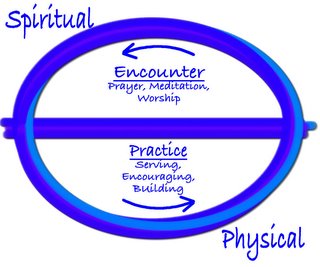This appeal to "the way things are" is found throughout scripture. Almost all the books of the Bible appeal to our knowledge of the world we live in, as they attempt to explain spiritual truths.
This is normally not much of a problem- until what the Bible says about the world differs from our experience- then we have to make a decision: do we take the Bible literally, or do we believe the product of our observation and reason, and interpret the Bible as speaking figuratively?
Just as we understand spiritual truths by analogy with day-to-day experience, so our spiritual experience helps us see our daily life with new eyes. Oscar Cullmann described this experience as a circle:

Now, we have built up certainties about our world that make it very hard to read the entire Bible as "literally true."
When you read this passage from Isaiah 55:12*
12 You will go out in joy
and be led forth in peace;
the mountains and hills
will burst into song before you,
and all the trees of the field
will clap their hands.
Most of us, based on our experience that mountains and hills do not sing, and trees do not clap, would identify this passage as poetry, and figurative (as opposed to literal).
Unlike the people who heard Isaiah for the first time, who would probably have agreed with us, the original hearers of Genesis 1 may well have taken the chapter at face value. Click here to visit a page that provides a picture of how biblical Hebrews may have viewed their world.
Now that our experience of the world is different (we believe in galaxies and billions of light-years of distance, and a round earth revolving the sun), is it fair that we re-interpret Genesis 1 more in line with how we read Isaiah 55:12? That is, should we concentrate on the spiritual truth God is trying to teach us, and not take the Bible as our science textbook?
Some suggest that we do just that; others say that this approach threatens the very foundations of the gospel. Central to my own faith is that God is the God of Truth; He has nothing to fear from science, because he made everything that scientists study.
This is not an area where Christians agree. Some, especially the Young Earth and Old Earth Creationists, view the Bible as containing information about the age and makeup of the earth that is accurate. Science is either wrong or misleading when it contradicts the Bible. Intelligent Design and Theistic Evolution might teach that in places where the Bible communicates a non-scientific perspective, it is speaking to a pre-scientific culture in words and images that made sense to them (much as we still speak of the "sun rising" when we know it is actually the world that turns).
What do you do? I believe that men and women of genuine faith study the facts, pray and read the Bible, and do the best they can. This is made difficult by the technical nature of the arguments. Few people can reach informed conclusions about such esoteric subjects as radio-carbon dating or the red-shift of light from distant galaxies. We are left to trust individuals; then it appears that trustworthy individuals disagree. My own approach is to believe that good ideas will be proven out. The germ theory of disease, the notion that fossils were actually mineralized creatures from the distant past, the formation of mountains, General Relativity, Quantum Mechanics - any many, many more ideas were controversial in their time, rejected by the scientific establishment, and gradually grew to be accepted. On the other hand, the history of science is littered with special pleading, meant to support some scriptural interpretation that has not withstood the test of time.
Under the circumstances, Paul's words to the Ephesians* apply:
4:1 As a prisoner for the Lord, then, I urge you to live a life worthy of the calling you have received. 2 Be completely humble and gentle; be patient, bearing with one another in love. 3 Make every effort to keep the unity of the Spirit through the bond of peace. 4 There is one body and one Spirit—just as you were called to one hope when you were called— 5 one Lord, one faith, one baptism; 6 one God and Father of all, who is over all and through all and in all.
But, beyond that, how do you determine what you believe? One approach is to read through the various viewpoints (see above), and prayerfully consider the options.
Here are some links to thinkers on the subject that I have found helpful. And this is a link to a site that takes seriously the religious issues raised by this line of questioning.
It takes time, it can be a bit frustrating trying to sort out the claims and counter-claims, but it is part of the process of coming to grips with the nature of the world we live in, the nature of the Bible, and the relationship that God wants to have with us. You have the rest of your life to wrestle with these questions- my prayer is that God will lead you to a good place!
* New International Version (NIV)
Copyright © 1973, 1978, 1984 by International Bible Society
NIV at IBS International Bible Society NIV at Zondervan

No comments:
Post a Comment